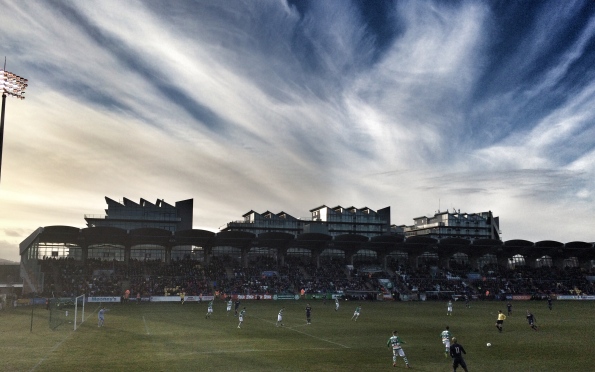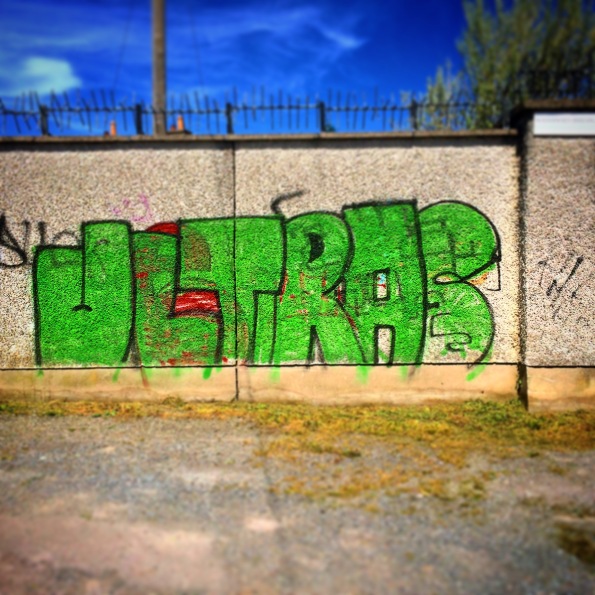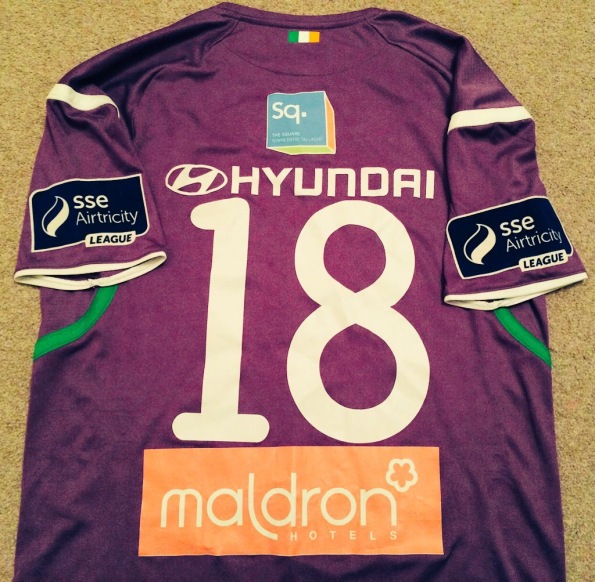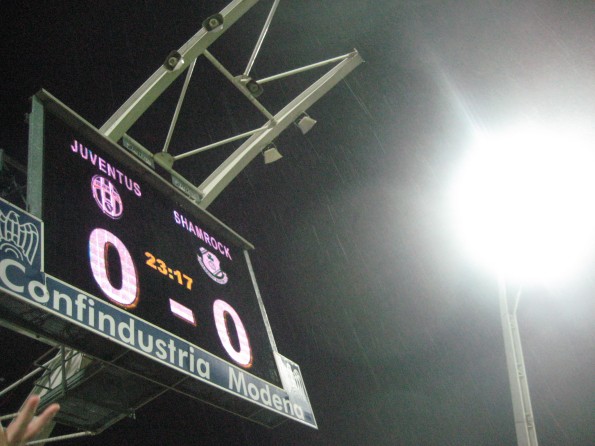The Tallaght Project – Stephen Bradley
Interview with Stephen Bradley (Hoops Scene 9/2015 – Shamrock Rovers v Sligo Rovers – 5 June 2015)
For over a decade the discussion about Shamrock Rovers in Tallaght was about bricks and mortar. The Tallaght Project priority was seeking to complete the half-finished stand languishing on Whitestown Way so that Rovers could finally play their first game in the Dublin 24 venue.
If there is such thing as a Tallaght Project now however, it is more likely about the structures being developed for player development throughout the club from schoolboys right through to the first team. Someone who has seen both these different Tallaght Projects at close hand is Stephen Bradley.

Growing up in Jobstown, Bradley was 11-years-of-age when there were the initial discussions began about Rovers moving to Tallaght. He saw the shell of the stadium develop and then lay idle for years when his time in Tallaght was visiting home during breaks from being a youth team player with Arsenal.
When Michael O’Neill looked to bring Bradley into the Hoops squad for the inaugural season in Tallaght, the player knew he was joining a club, now his local club, at the most exciting time in decades. He would line out in the opening night in the new stadium, play 63 games in two seasons with the Hoops and become part of a Rovers team that would win the club’s first league title since the days in the RDS.
Bradley has a remarkable story to tell and it is fascinating to hear him discuss going over to the UK on football trials before he was even a teenager, how he fell out of love with playing the game and how passionate he is now with his coaching role at Rovers.
At just 30 years of age, he is now back at Shamrock Rovers. Having left his playing career behind him he is now playing a crucial part in footballer development at the club, at both ends of the spectrum; he is in charge of player development at foundation stage (under 8s to 12s) and is also a vital member of Pat Fenlon’s first team coaching staff. Hoops Scene spoke to the player recently to discuss both his playing and coaching career and also his scouting work that he currently does for Arsenal.
So when did he first go over to the UK on trial? “I was 10,” said Bradley. “It is crazy when you think of it. Would I do it again? It was a massive opportunity but it is far too early. We are maybe in danger of going back towards that having come away from it in the last number of years. Now some kids are going at under 11s and 12s and I think that is too young.”
Late last year when Bradley was manager of the PFAI team at the Fifpro tournament in Oslo, he spoke about having signed for Arsenal on a big money contract at 17, his head was turned by the size of his bank balance despite not playing with the Gunners first team. He forgot that he was in London to learn his trade and not spend money on extravagant things. He is happy to share his thoughts on that experience and what he learned on his return to Ireland to play professional football where he won league titles first with Drogheda United and then with Rovers.
“I spoke about this as I felt not enough people were talking about it and nothing was been done to rectify it. I went over really young. I fell out of love with the game when I signed a professional contract. Some people may say ‘can clubs not set money aside so you don’t get it until you are 20’ but there are bigger issues. I didn’t deal with it very well but that was my scenario.
“If we want to keep producing players like Robbie Keane and Damien Duff, we need to look at how we are supporting our players before they go, when they go and when they come back. We shouldn’t just send them over to a cattle market at the age of 15 and say best of luck.”
Bradley believes that there is no reason why Ireland cannot develop talented young footballers. Having retired from playing the game at a relatively early age, the passion that he has for coaching players is clear when he speaks about it and how he was drawn to being part of setting up coaching structures at his former club here in Tallaght.
“I don’t believe Ireland can’t produce players, we do produce players. We just have to get them early enough when they are in the learning stage. Then they take it in and grasp what you are saying to them. We want to give kids an option of staying in Ireland and finishing their education. I would encourage any kid that has that option to do that.
“I wouldn’t have gotten involved if I didn’t believe the club wasn’t behind it or were only going to do for 18 months. I wouldn’t have any interest if players weren’t going to gain from it. It must be long term. From the board, to the first team manager and Shane Robinson (Rovers’ Head of Player and Coach Development), it is getting the backing right through the club.
“The end goal is to develop players for the first team. It isn’t a two or three year project. We will see in 10 to 15 years time six or seven players coming through from youth set up into the first team.
“The fans, the board and the coaches want to see that. Our aim is to get them into to team to show people you don’t have to go away at 15 like I did. You can stay here, play first team football for Shamrock Rovers at the age of 18. If they are good enough, then they can be sold on.
“The new under 17 league is needed because I saw schoolboy football players fall away from the game if they didn’t get over to England at 15. They thought they had missed their chance. This is showing them now that if you stay in football, play first team football with a top League of Ireland, you can move on.
“Look at Keith Fahey here at Rovers. He went over to the UK, came home and then went again. You look at so many who have done that (in the current Ireland international squad). It shows that if you play in this league and do well enough, you will go over at a stage when you are ready.
“My thing with the kids is that I’ve seen and gone through it not so long ago. I know why I didn’t fulfil my potential and I’m okay with that. But now it is about helping other kids become better players and deal with different scenarios. That is why I am so passionate about the youth side of the game as I feel I have something to offer. The younger you get them, the better. They hang onto every word you say and that is fantastic.”
Rovers have put a group of coaches together to run the underage set up with extensive experience playing both in the League of Ireland and in leagues outside the country. Shane Robinson (FK Haka), Stephen Bradley (who also spent time playing in Scotland), Graham Gartland (St. Johnstone), Keith O’Halloran (Middlesbrough) are all either UEFA A and B qualified, and along with Pat Deans, whose qualification is in Strength & Conditioning, all five of them played previously for Shamrock Rovers at different stages of their careers.
“I don’t believe you have to play at the top level to be a top coach or manager but it definitely helps when you are looking at these kids and you hear them saying to another ‘he played for Shamrock Rovers a few years ago’ It makes an impact with the kids. All of us involved have played with Rovers so it is great to have that connection to the club.

“After the kids come out of the Academy (weekend sessions in the Spawell for under 7s), we are trying to give them the basic elements of football. Control, pass, dribble. Let them express themselves. As they are enjoying it, they are learning about the game and that is what we are trying to do with them at that age.
“They play in leagues but there are no league tables until they go 10s. They train three times a week and then they play a game on the Saturday. There is supposed to be nobody keeping score but tell the parents and the other coaches that!
“The kids do ask about the score. I don’t think we will ever stop it but there is no harm in that! The main thing is that the adults don’t feed into that and say ‘we won or we lost on Saturday’. It isn’t about that. It is about the kids learning the basics of how to play football and letting them make decisions which is really important.
“Whether it is right or wrong, we encourage them to do that and over time they will learn whether it was correct or not. It isn’t up to us to tell them that, they need to work it out and I believe in the long term that will help them.
“Football is very different now. There is no street football being played anymore. People ask me how I was technically gifted but it was because I was on the street every day all day kicking the ball off a wall or the path. You kicked it at different angles and you had to control it in different ways but that is gone now and we have to try and replicate it.”
Some of the kids that take part in Rovers’ Academy programme were not even born when the Hoops played their first game in Tallaght back in March 2009. That is a game that standouts from Bradley’s playing career.
“Being from Tallaght I’d seen the slow progress (of the stadium) growing up. At one stage with a lot of things going on, you were thinking this may never happen. So to play in the first game in Tallaght stadium was special.
“When Michael O’Neill spoke to me about signing, I knew how big it was from growing up in the area. I knew there would be a good buzz but I never thought it would be as big as that night. The first game in Tallaght was massive. The whole build up to the game was absolutely unbelievable.
“When we came out, the ground was packed. We played well and we won. It was one of those nights that you look back on and you will never forget as it was a special night. When we came into the dressing room after the first game it was like winning the league. That was the buzz. All the lads had a high like we had won the title.”
While Rovers just missed out on winning the league in that opening season in Tallaght, the following year the Hoops did lift the league trophy. “I’ve been lucky to win things with a few teams (winning a title, FAI Cup and two Setanta Cups with Drogheda) but the Rovers one was special. As a Tallaght lad and hearing how long it was since winning the league, to win one was really special. It was something you thought it might never happen but that squad wanted to win things together and we did.”
Next month marks five years since Rovers’ famous encounter in the Europa League qualifiers with a club who over the weekend are looking to win the 2015 Champions League final in Berlin. “We played really well,” said Bradley speaking about the game against Juventus in Modena. That was a night where it took a moment of genius from Alessandro Del Piero to separate the teams.
“Del Piero put one in the net from 50 yards! I didn’t play in a game where I saw a better free kick. He was brilliant playing wise and after the game too. He came into us and brought us all into their dressing room and made sure we all swapped shirts. They were excellent.”
In between his coaching role with Rovers, Bradley also is a scout for Arsenal. Prior to his current role at Rovers, he did a lot of scouting in Europe for the Gunners. He would travel over to a league or international game in Europe. Now for scouting players outside of Ireland, Arsenal normally send him a live link of the game to watch.
“If you are doing stuff for the first team, the boss (Arsene Wenger) usually gives you a target to give a full report on. Other times you go to a game and they won’t tell you which player they are looking out for. They let you watch the game and see if you pick him out.
“It keep you on your toes! You have to be tuned in for the game and every player. When you are filling out the report on the system, you nearly always have to get the player that they have ear marked. I would look from first team players down to young players and all around Europe.
“Sometimes you might get a link from a live game somewhere else in the world and you have to scout Ronaldo or Messi. You have to forget about his reputation and scout him whether he has played well or not. They might get a few scouts to do that game and then they will compare reports. It is a good indication to see which scout is looking at certain things.
“The manager has always done it that way and you can see the results with their recruitment which has been some of the best around in the last 10 to 15 years. Coaching is what I love doing with the first team or with the young lads but scouting makes you look at the game in a different way. I love it. Training in the morning with the first team, doing stuff in the evenings with the kids or go to the North or down to Cork to watch a team or watch a live stream of a game. It is football 24/7!”

